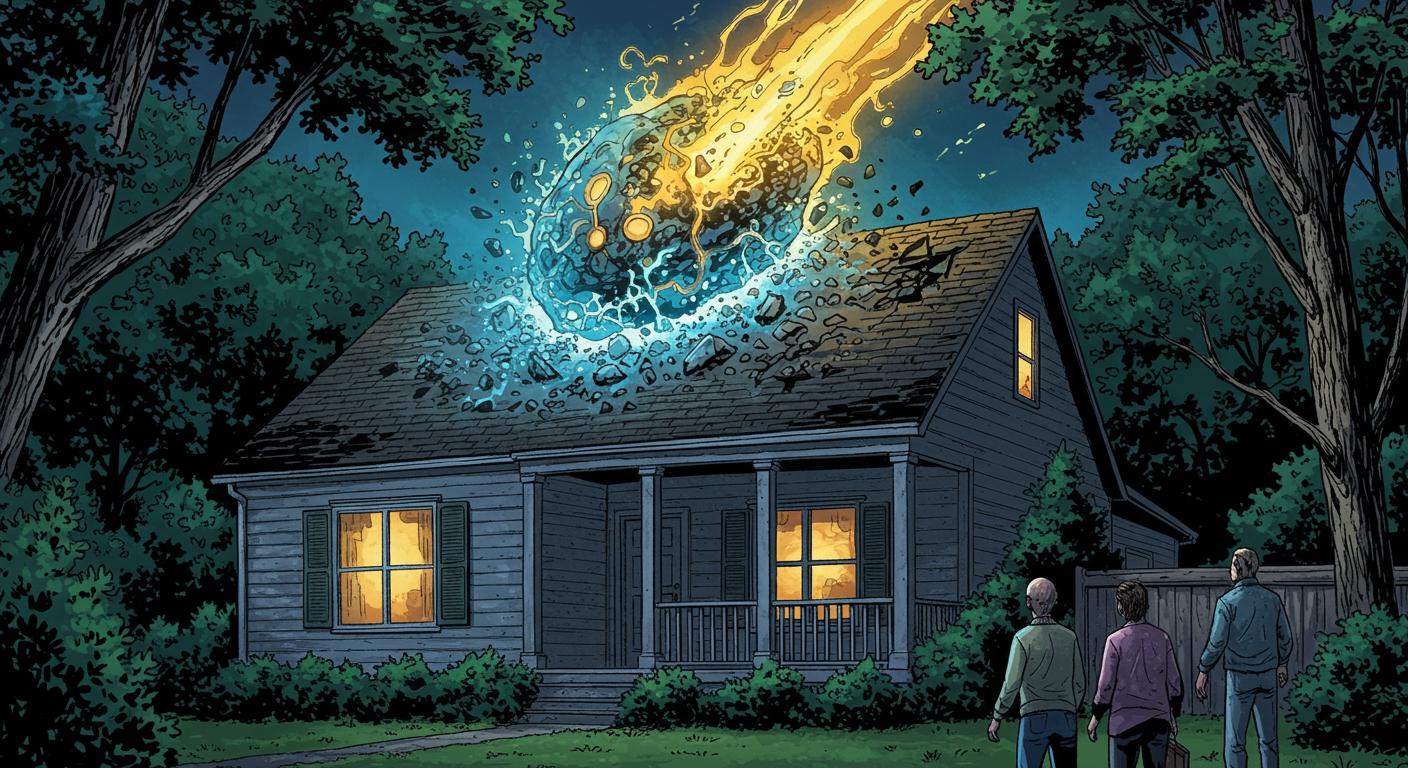There’s a certain humble poetry in the universe flinging a 4.56-billion-year-old relic through our modern shingles and sheetrock. In late June, a meteorite—now officially christened the McDonough Meteorite—punched through the roof of a Henry County, Georgia home, leaving behind a hole, some startled residents, and a small piece of cosmic detritus that predates our very planet. As various outlets have documented, including NewsNation, the story has all the trappings of a minor disaster, except the disaster in question arrived gift-wrapped in deep time.
An Interplanetary Time Capsule Lands in Suburbia
The meteorite’s journey, according to planetary geologist Scott Harris at the University of Georgia, began roughly 4.56 billion years ago—meaning this little cherry tomato–sized rock was busy forming before the Earth so much as existed. Laboratory analysis classified it as a Low Metal (L) ordinary chondrite, material forged in the presence of oxygen, suggesting its exceptional age noted in a report by The Georgia Sun. Harris and his team traced the meteorite’s origins to a family of asteroids in the main belt between Mars and Jupiter, believed to have resulted from the breakup of a much larger body about 470 million years ago—a detail highlighted across outlets covering the event.
The arrival itself was less stately, more dramatic. On June 26, a bright fireball streaked through the daytime skies of the Southeast, catching the attention of locals and setting off speculation about earthquakes, as described by both The Georgia Sun and Patch. The National Weather Service quickly clarified that the sonic boom had a much more extraterrestrial cause: a meteor barreling towards Henry County faster than the speed of sound. By the time it hit ground level, it was no larger than a cherry tomato yet still managed to punch through a roof, clip an air duct, and dent the floor hard enough to be mistaken for a gunshot echo, as University of Georgia researchers pointed out.
Meteorites hitting homes aren’t common, but when they do, they come with all the unpredictability of a cosmic home renovation. The rock was ultimately shattered into 23 grams’ worth of fragments, some of which will soon be on display at the Tellus Science Museum in Cartersville, Georgia, according to NewsNation. Meanwhile, the mundane side of the story involves a homeowner possibly vacuuming ancient meteor dust from the sofa—a true collision of the astronomical and the everyday.
Debris of Deep Time: The Cosmic Lottery
If there’s a broader takeaway here, it’s just how ordinary chance is anything but ordinary when the universe is involved. Bill Cooke, lead of NASA’s Meteoroid Environments Office (as cited in Patch), explained the initial sighting put the meteor at 48 miles above Oxford, Georgia, traveling over 30,000 mph before its fiery demise and fragmentation. The object’s dramatic end released energy equivalent to 20 tons of TNT, peppering communities across several counties with fleeting cosmic attention. Sightings were reported from Newton County to Forsyth and Dawson, each account adding to the momentary mythology of this bit of space rubble.
Scientists at the University of Georgia, collaborating with Arizona State University, are now shepherding the McDonough Meteorite through its formal adoption by the Meteoritical Society’s Nomenclature Committee, a process flagged in both The Georgia Sun and Business Standard. Fragments recovered from the impact are being weighed, catalogued, and, for the fortunate, displayed—so the larger public can gawk at an object whose biography stretches back past the beginnings of Earth itself.
There’s a strange intimacy to how this unfolded: A rock forged millions of years before Earth existed shoots across billions of miles, only to clip an air duct and deposit space dust on an unsuspecting Georgian’s sofa. Somewhere between “astronomically small” and “yet, evidently, nonzero” sit the odds for such an occurrence. It feels like fate and randomness arm-wrestling over your living room, with the universe snickering in the background.
Reflections at the Intersection of Cosmic and Everyday
It’s easy to overlook the genuinely odd, awe-inspiring stuff the universe tosses our way—often because, on impact, it looks like a small rock and a headache for the insurance adjuster. But as noted by The Georgia Sun, these meteorite fragments are essentially receipts from the birth of the solar system, providing clues to planetary origins that scientists are still teasing apart. For all its unimaginable scale and indifference, the universe occasionally delivers a memento intended for anyone who happens to be home at precisely the wrong—or right—moment.
How many people can say they need to vacuum up the remains of a visitor predating Earth itself? Maybe the strangest part is how, after the headlines fade and the dust is swept up, life in that Georgia home will return to normal. Except for the roof. And maybe, just maybe, for the way those homeowners now look at the night sky—wondering what else is quietly orbiting, waiting for its own crash landing.







